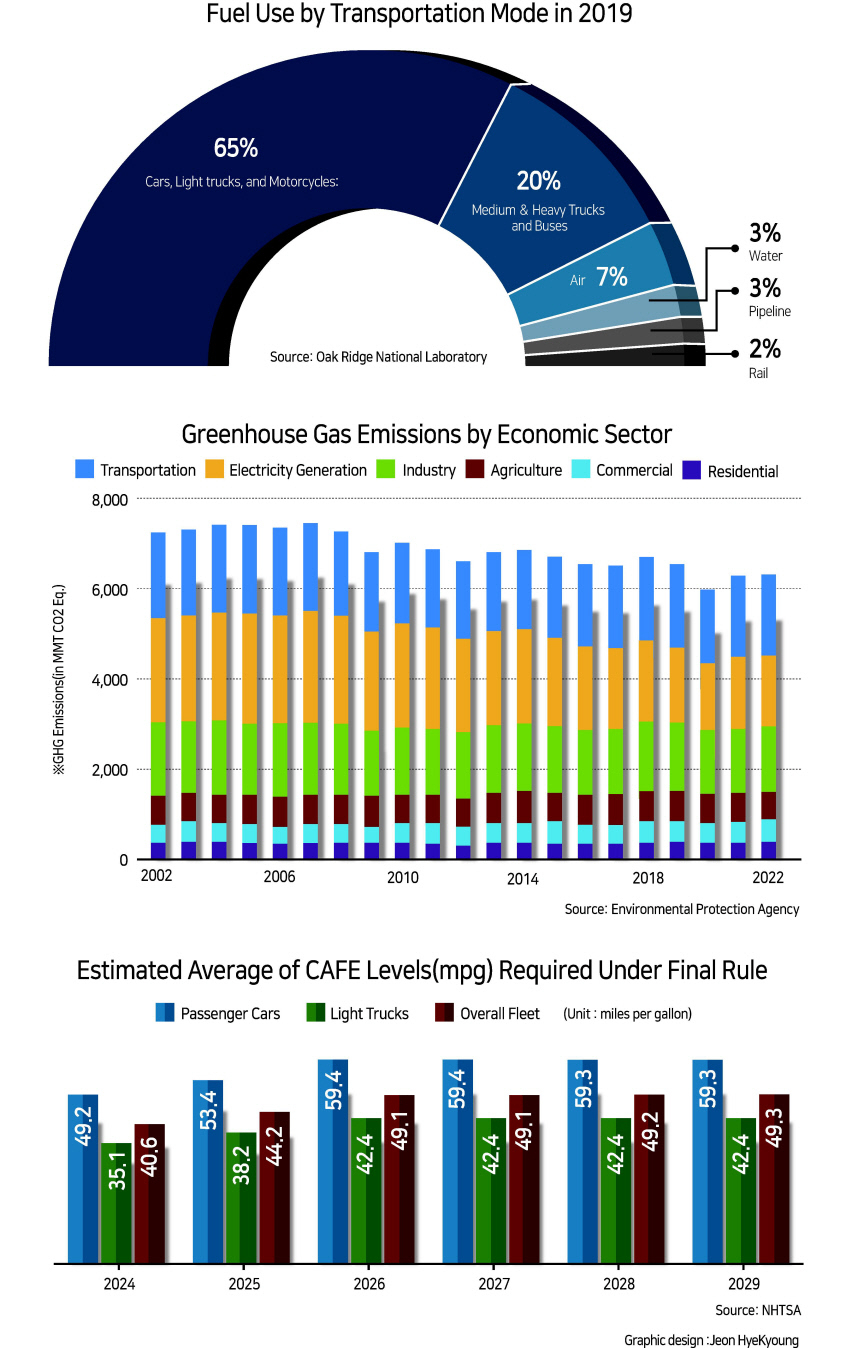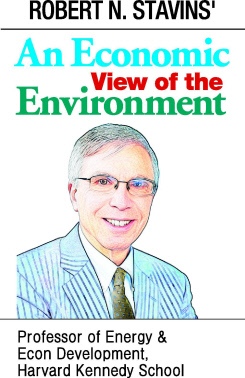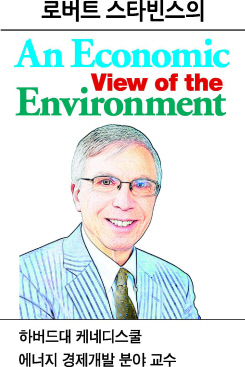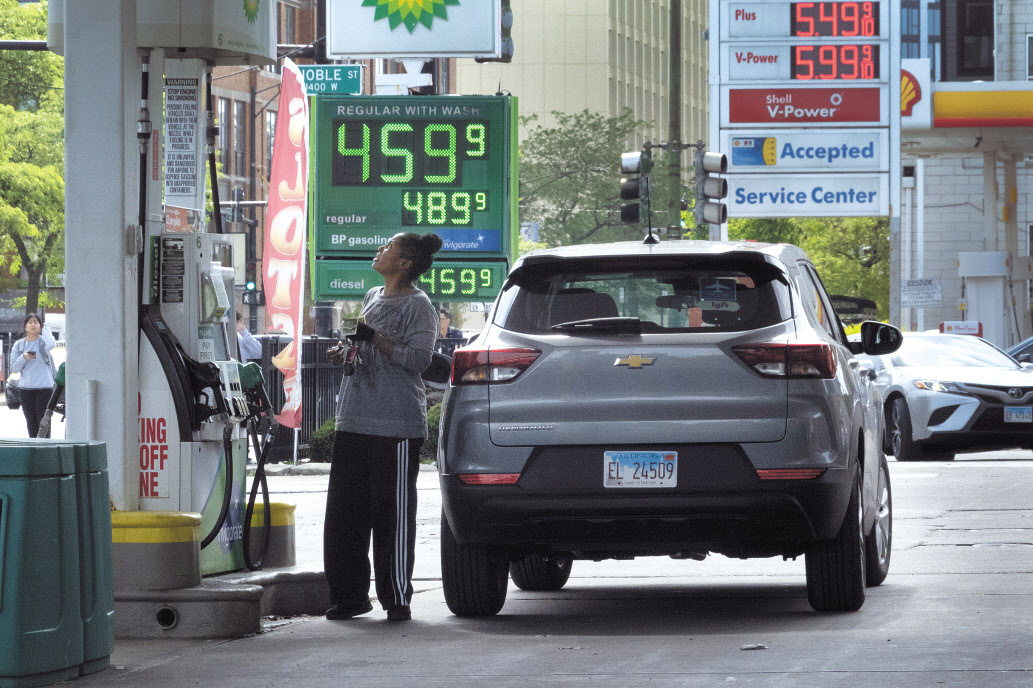

On May 19th, 2009, President Barak Obama announced new Federal fuel-efficiency standards for motor-vehicles that would make the then current standards ― known as Corporate Average Fuel Economy (CAFE) standards significantly more stringent. These CAFE standards measure compliance as the average of a company‘s entire fleet of cars, and so are more flexible and less costly than model-by-model standards, better matching consumer preferences and lowering production costs.
Other good news was that the administration‘s proposal would yield a single standard nationwide, rather than two fuel efficiency standards, one for California and the 13 other states that chose to follow its more stringent standards, and another standard for the rest of the country under the existing CAFE program. The result would have been that the states adopting the more stringent California standard would have brought about little incremental benefit for the environment beyond the national CAFE program, because auto manufacturers and importers would have largely undone the effects of the more stringent state-level fuel-efficiency requirements by selling more of the less fuel-efficient models in their fleets in the other states.
These newer Federal standards proposed by the Obama administration were therefore one small step along the path to meaningful reductions in greenhouse gas emissions that cause climate change. That‘s the good news. But it’s also true that CAFE standards, in general, are inferior to other possible approaches.
First of all, CAFE affects only the cars we buy, not how much we drive them, and so CAFE standards are less cost-effective than gasoline prices at reducing gasoline consumption, because gas prices (whether reflecting market conditions or government taxes) affect both which cars we buy and our choices about driving.
| ||
| A sign displays gas prices at a gas station on May 21, 2024 in Chicago, Illinois. President Joe Biden has said he will release 1 million barrels of gasoline from the strategic reserve to help reduce prices ahead of the July 4th holiday and summer driving season. |
Some people may think that CAFE standards ― unlike gas taxes ― are costless for consumers. But according to the Obama administration itself, the proposed increases in CAFE standards (including both scheduled increases already on the books and the new Obama proposal) would have added ― on average ― $1,300 to the cost of producing a new car.
Because CAFE standards increase the price of new cars, the standards have the unintentional effect of keeping older ― dirtier and less fuel-efficient ― cars on the road longer. This counterproductive effect is typical of any vintage-differentiated-regulation, an issue I have studied and written about, and on which there is abundant theoretical and empirical evidence.
Also, by decreasing the cost per mile of driving, CAFE standards ― like any energy-efficiency technology standard ― exhibit a “rebound effect,” namely, people have an incentive to drive more, not less, thereby lessening the anticipated reduction in gasoline usage. This has also been documented empirically.
The bottom line is that gasoline prices are a much more effective ― and more cost-effective ― means of cutting gasoline demand, both in the short term and long term. But if increasing gasoline prices through gas taxes is politically impossible ― which it is in the United States and some other countries ― why raise all of these objections? Am I allowing the (infeasible) perfect to be the enemy of the good? Not at all, as I can explain.
There is another policy instrument available that has the same desirable impacts as gas taxes on gasoline prices (and, more importantly, on all other fossil fuel prices, as well), and in some countries inspires dramatically less political opposition. And this instrument was not only politically feasible, but was already achieving remarkable, broad-based political support in Washington. I‘m talking about the economy-wide CO2 cap-and-trade system in Congressmen Waxman and Markey’s legislation in the U.S. House of Representatives. Their cap-and-trade system would have served to increase the price of gasoline, cut demand, and reduce emissions. But, in addition, its impacts would have gone far beyond automobiles and trucks, and beyond the transportation sector, as well. Of course, CO2 trading systems have been implemented successfully in more than thirty jurisdictions worldwide, including ― prominently ― the European Union, China, and Korea.
| ||
| Emissions fume at the coal-fueled Oak Grove Power Plant on April 29, 2024 in Robertson County, Texas. In conjunction with the Biden-Harris Administration’s attempt to curve climate change, the EPA (Environmental Protection Agency) has finalized four new rules which seek to reduce carbon emissions and mercury pollution amongst businesses and communities. Environmental regulators favor the decision, believing that the rules provide clear instruction and time allotment for power companies to begin finding solutions in providing reliable power while reducing harmful emissions. Industry groups have pushed back, stating that the change is coming at a time when more gas-fueled power is paramount. |
To seriously and cost-effectively address climate change, it is essential to put in place a single carbon price that affects all fossil fuels and all uses throughout the economy ― not only in the transportation sector, but also in the electric power, manufacturing, commercial, and residential sectors. This is precisely what cap-and-trade does. A meaningful, upstream, economy-wide cap-and-trade system will serve to increase the price of gasoline, as well as other fuels, electricity, and all goods and services in proportion to their carbon-intensity in production, and it does this (as would a carbon tax) in the right proportions for each fuel, energy source, and product, so that the overall cap is achieved at the least possible cost. The real bottom line is that cap-and-trade is the cheapest, best, and ― in some jurisdictions ― the only politically feasible approach that can achieve the significant reductions in CO2 emissions that will be necessary to meet ambitious climate goals.
Back to the Obama administration‘s CAFE proposal, a separate and distinct question is what would the effects have been on the U.S. automobile industry? Would it be “good for the auto industry,” as a White House press release claimed at the time? Does not the presence of so many leading auto executives who were on the podium with President Obama clearly indicate that this regulatory change would have been good for the U.S. auto industry?
First, it is surely the case that a single national standard is better for the auto industry ― and society more broadly ― than the dual system that would have been brought about by the 14 states going forward with more stringent standards, separately from the rest of the country. There is nothing new about the U.S. auto industry wanting a single national standard. Indeed, it was for this very reason that the industry supported the enactment of Federal clean air legislation in the 1970s. We all prefer bad news to news that is even worse, but that does not mean we welcome the bad news or that‘s it good for us.
It is also true that the U.S. auto industry has vastly less political clout than it had in earlier times, and a much smaller share of the U.S. automobile market. In the Obama years, the industry was in severe economic decline, indeed on the verge of bankruptcy, and it was dependent on massive government handouts. In that climate, it was hardly surprising that the U.S. auto industry was exceptionally cooperative with the Federal government.
But was this policy in the long-term interest of the U.S. auto industry; was this “good for the U.S. auto industry?” The answer to that question was unknown. Keep in mind that for decades U.S. auto manufacturers just barely complied with CAFE standards each year, while Japanese, Korean, and some other manufacturers and importers exceeded the standards. So, at first blush, it would appear that it might be easier ― less costly ― for Japanese and Korean companies than U.S. companies to meet heightened fuel-efficiency standards. I am not suggesting that the heightened standards would put the U.S. companies out of business, but simply that we did know at the time what the long-term impacts would actually be. In my view, we should be skeptical about any claims to the contrary. The best reason to carry out environmental policies is that we expect they will be good for the environment.
자동차 연비 기준에 대한 고찰


2009년 5월 19일, 바락 오바마 미국 대통령은 자동차 연비에 대한 새로운 연방기준을 발표했다. 이 새로운 기준은 당시의 현행 기준인 기업평균연비규제(Corporate Average Fuel Economy·CAFE)를 훨씬 더 강화시키는 것이었다. 이는 회사의 전체 차량의 평균 연비를 기준으로 준수 여부를 측정하므로 모델별 기준보다 유연하고 비용이 적게 들며 소비자의 선호에 더 잘 부합하면서 생산 비용을 낮출 수 있다.
또 다른 좋은 소식은 행정부의 제안으로 인해 캘리포니아를 비롯한 더 엄격한 기준을 따르기로 한 13개 주, 그리고 기존 CAFE 프로그램에 따라 나머지 주에 적용되는 두 가지 연비 기준 대신 전국적으로 단일한 기준이 마련된다는 점이다. 자동차 제조업체와 수입업체가 연비가 낮은 모델을 다른 주에서 더 많이 판매하면서 더 엄격한 주 차원의 연비 요건의 효과가 대부분 무효화될 수 있었기 때문에, 캘리포니아 기준을 채택한 주들이 가져올 환경 개선 효과는 전국CAFE 프로그램을 넘어서는 데 크게 기여하지 못하는 결과로 이어졌을 것이다.
따라서 오바마 행정부가 제안한 이 새로운 연방 기준은 기후 변화를 유발하는 온실가스 배출을 유의미하게 감소시키는 방향으로 나아가는 작은 한 걸음이었다. 이는 긍정적인 소식이다. 그러나 일반적으로 CAFE 기준이 다른 가능한 접근 방식들에 비해 효과가 떨어진다는 점도 사실이다.
우선, CAFE 기준은 우리가 구입하는 자동차에만 영향을 미치고, 자동차를 얼마나 운전하는지에는 영향을 주지 않는다. 반면, 휘발유 가격(시장 상황이나 정부 세금을 반영한)은 우리가 어떤 자동차를 구매할지와 운전습관에 영향을 미치기 때문에, 휘발유 소비를 줄이는 데 있어 CAFE 기준보다 비용 효율성이 더 높다.
일부 사람들은 CAFE 기준이 유류세와 달리 소비자에게 비용을 발생시키지 않는다고 생각할 수 있다. 그러나 오바마 행정부에 따르면, 이미 예정된 인상안과 오바마 대통령의 새로운 제안을 모두 포함한 CAFE 기준 인상안은 신차 생산 비용을 평균 1300달러 증가시키는 것으로 나타났다.
CAFE 기준은 신차 가격을 인상시켜, 연비가 낮고 더 많은 오염을 발생시키는 구형 자동차들이 더 오래 도로에 남아 있게 만드는 의도치 않은 효과를 불러일으킨다. 이러한 비생산적인 효과는 필자가 연구하고 저술한 모든 진입 연도에 따른 차별적 규정에서 나타나는 전형적인 현상이며, 이에 대한 이론적 및 실증적 증거도 충분히 있다.

또한, CAFE 기준은 마일당 주행 비용을 낮춤으로써 다른 에너지 효율 기술 표준과 마찬가지로 ‘반동 효과’를 나타낸다. 즉 사람들이 더 많이 운전하려는 유인동기가 발생해 휘발유 사용량의 예상 감소치가 줄어들게 된다. 이는 실증적으로도 입증된 바 있다.
결론적으로, 휘발유 가격은 휘발유 수요를 단기 및 장기적으로 줄이는 데 훨씬 더 효과적이고 비용 효율적인 수단이다. 하지만 유류세를 통한 휘발유 가격 인상이 정치적으로 불가능하다면 (미국과 일부 국가에서는 그러하다) 왜 이런 반대 의견이 제기되는 것일까. 필자가 실행 불가능한 완벽을 좋은 것의 적으로 만들고 있는 것인가. 전혀 그렇지 않다. 그 이유를 설명해 보겠다.
휘발유 가격과 이보다 더 중요한 다른 모든 화석 연료 가격에 유류세와 같은 바람직한 영향을 미치면서도 일부 국가에서는 정치적 반대가 극적으로 줄어드는 또 다른 정책 수단이 있다. 이 제도는 정치적으로 실행 가능할 뿐만 아니라, 이미 워싱턴에서 주목할 만한 광범위한 정치적 지지를 얻고 있었다.
필자가 말하고 있는 제도는 미국 하원의 와스만 의원과 마키 의원이 발의한 경제 전반에 걸친 CO2 배출권 거래제도다. 이들의 탄소 배출권 거래제도는 휘발유 가격을 인상하고 수요를 줄이며 배출량을 감소시키는 데 기여했을 것이다. 이 제도의 영향은 자동차와 트럭을 넘어 교통 부문 전반으로 확산됐을 것이다. 실제로 CO2 배출권 거래제도는 유렵연합, 중국, 한국을 비롯한 전 세계 30개 이상의 국가에서 성공적으로 시행되고 있다.
기후 변화를 진지하고 비용 효율적으로 해결하기 위해서는 교통 부문뿐만 아니라 전력, 제조업, 상업, 주거 부문 등 모든 화석 연료와 그 용도에 영향을 미치는 단일 탄소 가격을 설정하는 것이 필수적이다. 이것이 바로 탄소 배출권 거래제도의 역할이다. 유의미한 경제 전반에 걸친 상류 배출권 거래제도는 휘발유를 비롯한 모든 연료, 전기, 그리고 각종 상품 및 서비스의 가격을 생산 과정에서 배출된 탄소에 비례해 인상시킬 것이다. 이는 탄소세와 마찬가지로 각 연료, 에너지원, 제품에 대해 적절한 비율로 작용해 전체 배출 한도를 최소 비용으로 달성할 수 있도록 한다. 핵심은 배출권 거래제도가 가장 저렴하고 효과적인 방법이라는 점이다. 또한, 일부 지역에서는 CO2 배출량을 크게 감소시켜 야심찬 기후 목표를 달성할 수 있는 유일한 정치적으로 실현 가능한 접근법이기도 하다.

오바마 행정부의 CAFE 기준 제안으로 돌아가서, 별도로 제기되는 중요한 질문은 이것이 미국 자동차 산업에 어떤 영향을 미쳤을까 하는 것이다. 당시 백악관 보도 자료에서 주장한 것처럼 “자동차 산업에 이로운 것”이었을까. 수많은 주요 자동차 업계 임원들이 오바마 대통령과 함께 단상에 올랐다는 것이 이 규제 변화가 미국 자동차 산업에 도움이 될 것임을 보여준 것이 아닐까.
먼저, 14개 주가 다른 주와는 별도로 더 엄격한 기준을 시행함으로써 발생하는 이중 체계보다 단일 국가 기준이 자동차 산업과 사회 전체에 더 유리하다는 것은 분명한 사실이다. 미국 자동차 산업이 단일한 국가 기준을 원하는 것은 새로운 일이 아니다. 실제로 1970년대에 자동차 업계가 연방 청정 공기 법안 제정을 지지한 것도 바로 이러한 이유 때문이다. 우리는 모두 더 나쁜 소식보다는 덜 나쁜 소식을 선호하지만, 그렇다고 해서 덜 나쁜 소식을 환영하거나 그것이 우리에게 좋은 소식이라는 의미는 아니다.
미국 자동차 산업의 정치적 영향력이 예전에 비해 크게 감소했고, 미국 자동차 시장에서 차지하는 비중 또한 상당히 줄어들었다는 것도 사실이다. 오바마 행정부 시절, 자동차 산업은 심각한 경기 침체로 파산 위기에 직면해 있었고, 정부의 막대한 지원금에 의존하고 있었다. 이러한 상황에서 미국 자동차 산업이 연방 정부에 매우 협조적이었던 것은 당연한 일이다.
그러나 이 정책이 미국 자동차 산업의 장기적 이익에 부합했는지, 그리고 ‘미국 자동차 산업에 이로웠을까’라는 질문에 대한 답은 명확하지 않았다. 수십 년 동안 미국 자동차 제조업체는 CAFE 기준을 간신히 준수해왔지만, 일본과 한국, 일부 다른 제조업체와 수입업체는 기준을 초과 달성했다는 사실을 기억해야 한다. 따라서 언뜻 보기에는 일본과 한국 기업이 강화된 연비 기준을 미국 기업보다 더 쉽게, 더 저렴하게 충족할 수 있는 것처럼 보일 수 있다. 강화된 기준이 미국 기업을 폐업시킬 것이라고 주장하는 것이 아니다. 다만, 당시 우리는 그 기준이 장기적으로 어떤 영향을 미치게 될지 정확히 알고 있었다. 그와 반대되는 주장에 대해서는 의구심을 가질 필요가 있다. 환경 정책을 시행해야 하는 가장 좋은 이유는 그 정책이 환경에 도움이 될 것이라는 기대 때문이다.
hongi@heraldcorp.com














